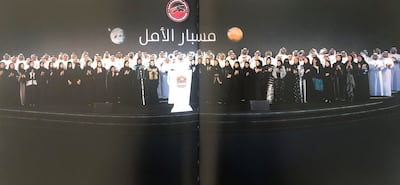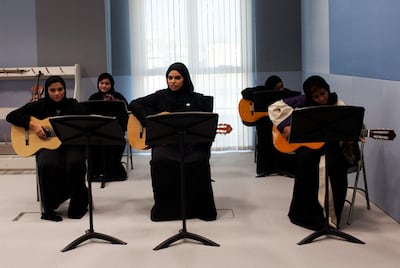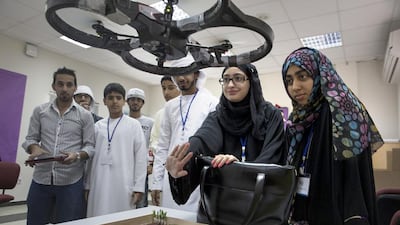They helped take the UAE to Mars, making us the first Arab country to gain first-hand insight into the planet’s atmosphere. They led groundbreaking research into Covid-19 treatments in an effort to save countless lives and accelerate the global recovery from the pandemic. They have worked to engineer solutions to some of our most pressing energy challenges as we urgently seek to address the impact of climate change.
On the International Day of Women and Girls in Science, we must take a moment to reflect on the incredible advances of women and young female leaders in the so-called Stem fields. This day also affords us the opportunity to identify ways in which we may work with our international partners to ensure that women everywhere may enjoy the chance to thrive.
From youth, Emirati women are inspired to explore their unique talents and academic pursuits. They are never told what they cannot be. Rather, at every turn, they are encouraged to reach new frontiers, with female role models paving the way: from world-leading scientists to aeronautical engineers and pioneers in Fourth Industrial Revolution technologies, Emirati women have the world ahead of them. Such a process starts from their earliest days of education.
Since its very foundation as a country, the UAE has recognised that education is key to the economic empowerment of women. According to the World Economic Forum’s Global Gender Gap report for 2020, the UAE was one of the region’s best-performing countries, having closed 65.5 per cent of its overall gender gap.

Over 77 per cent of Emirati women enroll in higher education after secondary school and make up 70 per cent of all university graduates in the UAE. Notably, 61 per cent of university graduates in scientific fields are women. Once finished with their university education, women in the UAE have near-limitless employment options ahead of them. Many of them choose to work in Stem fields to contribute to the country’s development in advanced fields such as artificial intelligence, robotics and industrial technology.
When Emirati women look around, they constantly see female representation that encourages them on their path. In fact, 55.5 per cent of the members of the Emirates Scientists Council are women, 34 per cent of the Emirates Mars Mission team was comprised of women, and women made up 70 per cent of the team behind the UAE Astronaut Programme, which produced the UAE’s first astronaut.
When women are educated and engaged in work, overall metrics concerning their empowerment in society also improve. That’s why the UAE ranked first in the Arab world and 18th globally in the UN Development Programme’s 2020 Gender Equality Index.
However, promoting women’s advancement in Stem fields is not only a domestic priority; it’s part of the UAE’s international approach to securing the right to an education for women and girls around the world.
Notably, the UAE promoted the equal right to education for every girl during its membership of the UN Human Rights Council. In June 2017, the UN Human Rights Council unanimously passed a draft resolution put forth by the UAE during the 35th session of the Council in Geneva on girls’ right to receive an education. The resolution called upon states to eliminate obstacles to girls' education, including discriminatory policies, poverty, religious considerations, or financial hardship. It also called for additional action to ensure girls' safety outside of school against sexual violence and threats posed by terrorist groups.

The UAE also initiated a joint statement by 75 countries at the Human Rights Council in June 2014 to condemn attacks on girls who attend or wish to attend school. In addition, the UAE championed the unanimous adoption by the Council in September 2014 of a resolution to convene a panel discussion the following year to share best practices on realising the equal right to education by every girl around the world.
And yet, it is not enough for us to simply call for increased global awareness to promote education for women and girls. The UAE is taking concerted action through material and financial means to help fund international initiatives in this regard. Last July, the country announced a pledge of Dh367 million ($100m) to the Global Partnership for Education to support educational programmes in developing countries over the coming five years. This was the UAE’s second donation, where the country donated the same amount over the 2018-2020 period.
The UAE has been keen to work with its regional and international partners to develop the skills women, girls and youth need for long-term success, particularly in light of the challenges posed by the Covid-19 pandemic around the world.
Many partner countries need vital support to enhance their national education systems, as the pandemic has disrupted educational continuity in many countries and exacerbated inequalities where e-learning is made difficult or impossible by underdeveloped technological infrastructure.
Ultimately, the UAE is working to ensure the provision of education to women and girls to support the fourth goal of the UN Sustainable Development Goals 2030 Agenda, which aims to ensure inclusive and equitable education and promote lifelong learning opportunities for all.
While the country explores additional efforts to shift the balance in favour of women and girls pursuing education and a promising future in Stem fields, it has set in motion many initiatives to ensure women can stand at the forefront of national progress and scientific advancement. Investing in girls by ensuring equal access to education and employment is vital to inspiring and engaging with all women in a lifelong journey of empowerment and lasting change in society.
Ahood Abdulla Eissa Alzaabi is the director of the UN Department at the UAE’s Ministry of Foreign Affairs and International Co-operation


